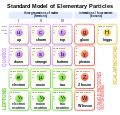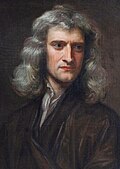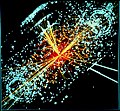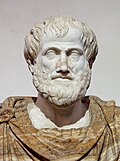Portal:Physics
The Physics Portal


Physics is the scientific study of matter, its fundamental constituents, its motion and behavior through space and time, and the related entities of energy and force. It is one of the most fundamental scientific disciplines. A scientist who specializes in the field of physics is called a physicist.
Physics is one of the oldest academic disciplines. Over much of the past two millennia, physics, chemistry, biology, and certain branches of mathematics were a part of natural philosophy, but during the Scientific Revolution in the 17th century, these natural sciences branched into separate research endeavors. Physics intersects with many interdisciplinary areas of research, such as biophysics and quantum chemistry, and the boundaries of physics are not rigidly defined. New ideas in physics often explain the fundamental mechanisms studied by other sciences and suggest new avenues of research in these and other academic disciplines such as mathematics and philosophy.
Advances in physics often enable new technologies. For example, advances in the understanding of electromagnetism, solid-state physics, and nuclear physics led directly to the development of technologies that have transformed modern society, such as television, computers, domestic appliances, and nuclear weapons; advances in thermodynamics led to the development of industrialization; and advances in mechanics inspired the development of calculus. (Full article...)
In physics, M-theory is a theory that unifies all consistent versions of superstring theory. Edward Witten first conjectured the existence of such a theory at a string theory conference at the University of Southern California in 1995. Witten's announcement initiated a flurry of research activity known as the second superstring revolution. Prior to Witten's announcement, string theorists had identified five versions of superstring theory. Although these theories initially appeared to be very different, work by many physicists showed that the theories were related in intricate and nontrivial ways. Physicists found that apparently distinct theories could be unified by mathematical transformations called S-duality and T-duality. Witten's conjecture was based in part on the existence of these dualities and in part on the relationship of the string theories to a field theory called eleven-dimensional supergravity.
Although a complete formulation of M-theory is not known, such a formulation should describe two- and five-dimensional objects called branes and should be approximated by eleven-dimensional supergravity at low energies. Modern attempts to formulate M-theory are typically based on matrix theory or the AdS/CFT correspondence. According to Witten, M should stand for "magic", "mystery" or "membrane" according to taste, and the true meaning of the title should be decided when a more fundamental formulation of the theory is known. (Full article...)
Did you know -

- ...that Isaac Newton originally defined force as the rate of change of momentum with respect to time?
Selected image -

Related portals
June anniversaries

- 1 June 1831 – James Clark Ross discovers the North Magnetic Pole.
- 1 June 1869 – Thomas Edison receives a patent for his electric voting machine.
- 1 June 1910 – Robert Falcon Scott expedition leaves England for South Pole.
- 1 June 1978 – First Patent Cooperation Treaty international filings.
- 1 June 1980 – Cable News Network (CNN) begins broadcasting.
- 1 June 1990 – Bush and Gorbachev sign chemical weapons ban.
- 1 June 2000 – Patent Law Treaty is signed.
- 2 June 1966 – Surveyor 1 lands on the Moon.
- 2 June 2003 - ESA launches Mars Express probe to Mars.
- 3 June 1965 - First American spacewalk, mission Gemini IV
- 3 June 1973 – A Soviet supersonic Tupolev Tu-144 crashes.
- 4 June 781 BC – First historic solar eclipse is recorded in China.
- 4 June 1973 – A patent for the ATM is granted.
- 4 June 1996 - First flight. Ariane 5 rocket explodes after roughly 20 seconds.
- 5 June 1977 – Apple II, personal computer goes on sale.
Birthdays
- 1 June 1633 – Geminiano Montanari, Italian astronomer (d. 1687)
- 1 June 1796 – Nicolas Léonard Sadi Carnot, French physicist (d. 1832)
- 1 June 1899 – Edward Charles Titchmarsh, English mathematician (d. 1963)
- 1 June 1907 – Frank Whittle, invented jet engine. (d. 1996)
- 1 June 1917 – William S. Knowles Nobel Prize laureate
- 1 June 1940 – Kip Thorne, American physicist
- 2 June 1930 – Pete Conrad, American astronaut (d. 1999)
- 2 June 1949 – Heather Couper, British astronomer
- 3 June 1659 – David Gregory, Scottish astronomer (d. 1708)
- 3 June 1923 – Igor Shafarevich, Russian mathematician
- 4 June 1704 – Benjamin Huntsman, English inventor and manufacturer (d. 1776)
- 4 June 1877 – Heinrich Wieland, German biochemist & Nobel laureate (d. 1957)
- 4 June 1916 – Robert F. Furchgott, American chemist & Nobel laureate (d. 2009)
- 4 June 1967 – Robert Shane Kimbrough, American astronaut
- 5 June 1760 – Johan Gadolin, Finnish scientist (d. 1852)
- 5 June 1819 – John Couch Adams, English astronomer (d. 1892)
- 5 June 1862 – Allvar Gullstrand, Swedish ophthalmologist Nobel laureate (d. 1930)
- 5 June 1900 – Dennis Gabor, Hungarian physicist, Nobel laureate (d. 1979)
- 5 June 1965 – Michael E. Brown, American astronomer
- 13 June 1831 - James Clerk Maxwell, Scottish physicist (d. 1879)
General images
Categories

Fundamentals: Concepts in physics | Constants | Physical quantities | Units of measure | Mass | Length | Time | Space | Energy | Matter | Force | Gravity | Electricity | Magnetism | Waves
Basic physics: Mechanics | Electromagnetism | Statistical mechanics | Thermodynamics | Quantum mechanics | Theory of relativity | Optics | Acoustics
Specific fields: Acoustics | Astrophysics | Atomic physics | Molecular physics | Optical physics | Computational physics | Condensed matter physics | Nuclear physics | Particle physics | Plasma physics
Tools: Detectors | Interferometry | Measurement | Radiometry | Spectroscopy | Transducers
Background: Physicists | History of physics | Philosophy of physics | Physics education | Physics journals | Physics organizations
Other: Physics in fiction | Physics lists | Physics software | Physics stubs
Physics topics
Classical physics traditionally includes the fields of mechanics, optics, electricity, magnetism, acoustics and thermodynamics. The term Modern physics is normally used for fields which rely heavily on quantum theory, including quantum mechanics, atomic physics, nuclear physics, particle physics and condensed matter physics. General and special relativity are usually considered to be part of modern physics as well.
More recognized content
Associated Wikimedia
The following Wikimedia Foundation sister projects provide more on this subject:
-
Commons
Free media repository -
Wikibooks
Free textbooks and manuals -
Wikidata
Free knowledge base -
Wikinews
Free-content news -
Wikiquote
Collection of quotations -
Wikisource
Free-content library -
Wikiversity
Free learning tools -
Wikivoyage
Free travel guide -
Wiktionary
Dictionary and thesaurus
Sources
Portals on Wikipedia














































































